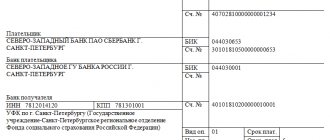All employees are entitled to paid leave annually. The main one must last at least 28 days, and in some cases the law also provides for additional vacations. When an employee resigns, he or she may have unused vacation days. Then you can take a vacation with subsequent dismissal or receive cash compensation from the employer for unused vacations - this possibility is provided for in Article 127 of the Labor Code of the Russian Federation. How compensation for unused vacation is subject to insurance premiums will be discussed below.
What payments are due upon dismissal?
On the last day of work, as a general rule, regardless of the reason for the employee’s dismissal, he must be paid:
- all due wages on the day of dismissal,
- compensation for missed vacation days.
When terminating an employment contract due to staff reduction, liquidation of an organization, often when terminating an employment contract by agreement of the parties, in addition to the above payments, the quitter is paid severance pay. In addition, if an employee is laid off, he is entitled to retained earnings for the duration of his employment.
How are contributions calculated under the new rules?
Rates are reduced for companies using basic tariffs. Moreover, only in terms of the income of each individual for a calendar month exceeding the federal minimum wage. For smaller amounts, the contribution rates to the funds remained the same.
Let us reflect the tariff rates effective from 04/01/2020 in the table:
| Insurance premiums | Tariffs for insurers who are SMEs | |
| For amounts within the minimum wage, % | For incomes above the minimum wage, % | |
| Pension Fund | 22 | 10 |
| FSS (VNiM) | 2,9 | 0 |
| FFOMS | 5,1 | 5 |
| Total: | 30 | 15 |
In 2021, the federal minimum wage is 12,130 rubles. The “minimum wage” established by the laws of the constituent entities of the Russian Federation does not affect the calculation of insurance premiums.
Compensation for unused vacation
Every year, the employer is obliged to provide an employee with leave of 28 calendar days while maintaining average earnings (Article 114 of the Labor Code of the Russian Federation). If at the time of dismissal the vacation has not been taken off completely, these days must be compensated (Article 127 of the Labor Code of the Russian Federation). If vacation is provided in advance, then the amount previously paid for excessive vacation days is withheld from the employee. Whether compensation upon dismissal is subject to insurance contributions is regulated by Article 422 of the Tax Code of the Russian Federation. In paragraphs Clause 2, paragraph 1 of this article states that compensation for vacation pay cannot be excluded from the object of taxation with insurance contributions.
For each month worked in full, an employee is entitled to 2.33 calendar days of vacation. Moreover, if in the last month of work an employee worked more than 15 days, then he is considered fully worked and is included in the calculation. If less, then the month is excluded from the calculation.
| Limited Liability Company "Pion" ORDER dated 02/05/2020 No. 111 On payment of compensation for unused vacation upon dismissal In connection with the dismissal of manager Semenov Semen Semenovich on 02/06/2020, in accordance with order No. 110 of 02/05/2020 and guided by Article 127 of the Labor Code of the Russian Federation, I ORDER:
General Director A.V. Voronov |
The amount of compensation for vacation unused on the last day of work is calculated using the formula:
The average daily income is determined similarly to the calculation of vacation pay (clause 10 of the procedure approved by government decree No. 922 of December 24, 2007).
Who has the right to apply reduced rates?
New rules for calculating insurance premiums are in effect from 04/01/2020 (Article of Law dated 04/01/2020 No. 102-FZ). The changes apply only to small and medium-sized businesses (including micro-enterprises). To apply the 15% rate, the company (or individual entrepreneur) must be listed in the SME register. You can check whether a company is included in the relevant list using a special ]]>service]]> on the Federal Tax Service website.
For large enterprises, the benefit established by Law No. 102-FZ of April 1, 2021 is not valid.
Insurance premiums and personal income tax
The procedure for levying insurance premiums and personal income tax depends on the type of payment in the final settlement. Compensation for unused vacation is subject to insurance contributions and personal income tax in full (clause 2, clause 1, article 422 and clause 3, article 217 of the Tax Code of the Russian Federation). And other types of compensation upon dismissal will be subject to contributions depending on their size. If the amount of payments, including severance pay and average monthly earnings, does not exceed the amount of the three-month average salary of the resigning employee, then they are exempt from insurance contributions and personal income tax in full (clause 2, clause 1, article 422 of the Tax Code of the Russian Federation). From the amount of compensation payments to a former employee that exceeds three times the amount of wages, it is necessary to calculate and pay insurance contributions to the budget, and personal income tax must be withheld from them.
IMPORTANT!
Severance pay, retained income during employment, and other compensation upon dismissal are taxed if their total amount exceeds three times the employee’s average monthly earnings. And vacation compensation upon dismissal is always subject to insurance contributions and personal income tax.
Is it taxable?
Compensation for unused vacation days is accrued either upon dismissal or in the event of replacement of additional days with money. How to calculate compensation?
The accrued amount in favor of the employee is subject to taxation, since this type of payment is not included in the list of non-taxable income from Article 20.2 of Law 125-FZ as amended. dated 07/29/2017.
Compensation is subject to personal income tax at a rate of 13% and insurance premiums at a general rate of 30%.
In this case, income tax is withheld from the accrued amount, and insurance contributions are calculated in excess of compensation and are transferred at the expense of the employer.
Deductions include payments for compulsory pension, social and medical insurance:
- 22% is allocated to compulsory public health insurance;
- 2.9% - for VNIM (temporary disability and maternity);
- 5.1% - for compulsory medical insurance.
These types of insurance contributions are paid to the Federal Tax Service.
In addition, you must also calculate the percentage for injuries from the accrued compensation; its rate may vary, but the minimum is 0.2%.
Online calculator for calculating compensation - calculate.
Are holiday pay contributions subject to payment?
Severance pay and retained earnings during employment
If the employment contract is terminated due to staff reduction, the employer is obliged to pay severance pay in the amount of average monthly earnings (Article 178 of the Labor Code of the Russian Federation). By agreement of the parties, the amount of severance pay is limited to the financial capabilities of the employer. In this case, the payment procedure is prescribed in a collective or employment agreement and is specified in the agreement between the employee and the employer. Also, an employee dismissed due to layoffs retains his average earnings for the duration of his employment, but not more than two months. The calculation of retained income also includes severance pay. In exceptional cases, earnings are retained for another month if the right to it is confirmed by the employment service.
The calculation of severance pay and retained earnings during layoffs is similar:
The number of working days during the payment period is determined according to the organization’s work schedule. The calculation begins on the working day following the dismissal. For example, if an employee quit on June 25, 2020, then severance pay is paid to him for the period from June 26, 2020 to July 25, 2020. Saved earnings for the second month will be calculated for the period from 07/26/2020 to 08/25/2020.
The average daily earnings are calculated based on payments for the last 12 months preceding the month of dismissal, in accordance with paragraph 4 of Resolution No. 922. The calculator for calculating leave compensation upon dismissal will help you not make mistakes in the calculations.
Deadline for transferring contributions from the salary of the dismissed person
All contributions must be transferred no later than the 15th day of the month following the month of payment of income (clause 1 and clause 3 of Article 431 of the Tax Code of the Russian Federation). This rule also applies when dismissing an employee.
However, for the purpose of paying contributions, the date of payment is the day of actual delivery of the amounts to the employee (clause 1 of Article 424 of the Tax Code of the Russian Federation). If this date falls on a weekend, then payments should be made no later than on the next working day.
Example 1
The employee resigned on 9/20/20__. On the same day, full payment was made to him. The due date for payment of contributions is no later than 10/15/20__.
Example 2
The employee quit on 09/20/20__, but did not show up for the payment, and only requested it on 10/01/20__. The accounting department carried out the calculation and payment of the debt on 10/02/20__. The due date for payment of contributions in this case should be 11/15/20__. But this day falls on a weekend, so the deadline is until 11/16/20__.
Read also
23.10.2020
Withholding personal income tax
Severance pay always refers to compensation associated with dismissal. Therefore, according to Article 217 of the Tax Code, income tax contributions on this amount are not paid . But one of the paragraphs sets some restrictions related to the amount. The rule is the same as in the previous case. An amount equal to three or six times the monthly salary of a particular employee is exempt from fees.
Retirement or agreement between the parties are situations when the employer may have problems with what type of payment to classify. If such payments are described in an employment or collective agreement, then they can be regarded as provided in accordance with the law.
Who is prohibited from replacing vacation with money?
Certain categories of working citizens who are entitled to extended leave due to special circumstances will not be able to receive material payments instead of rest days, since this is prohibited by law. The list of persons who will have to use vacation days in full is indicated in Article 126 of the Labor Code . These include:
- women during pregnancy;
- employed minor workers;
- persons working in heavy or hazardous work.
How many vacation days can be replaced with money?
It is worth noting that extended leave for harmful or difficult working conditions can be partially compensated, only for a period that exceeds 7 days .
That is, the employee will annually rest 28 days of the main vacation, 7 days of extended vacation, and the remaining days, if any remain, can be replaced with cash payments. Rate the quality of the article. Your opinion is important to us:
How calculations are displayed in RSV
Such payments fall into the RSV in full. To do this, fill out sections 1, 2 and 3. After this, a database is formed, which is used in the future.
It is necessary to take into account additional payments for which the employer is responsible:
- Upon dismissal of directors and chief accountants.
- Average earnings for employment within three months.
- Due to early dismissal.
- Regular severance pay.
Passing the DAM is mandatory for employers representing the following categories:
- Individuals who do not have individual entrepreneur status.
- Heads of peasant farms.
- IP.
- Separate divisions of foreign organizations operating on the territory of the Russian Federation.
- Separate divisions of Russian organizations that independently pay income to employees transfer all necessary funds to the budget.
Sometimes there is a need to register a zero RSV:
- Heads of peasant farms, if there are no employees, do not conduct business.
- Organizations or individual entrepreneurs subject to the same conditions.
- The only founders who also serve as CEOs.
Important! If the number of employees does not exceed 10 people, then reporting is submitted in paper form. Otherwise, registration takes place only electronically.









